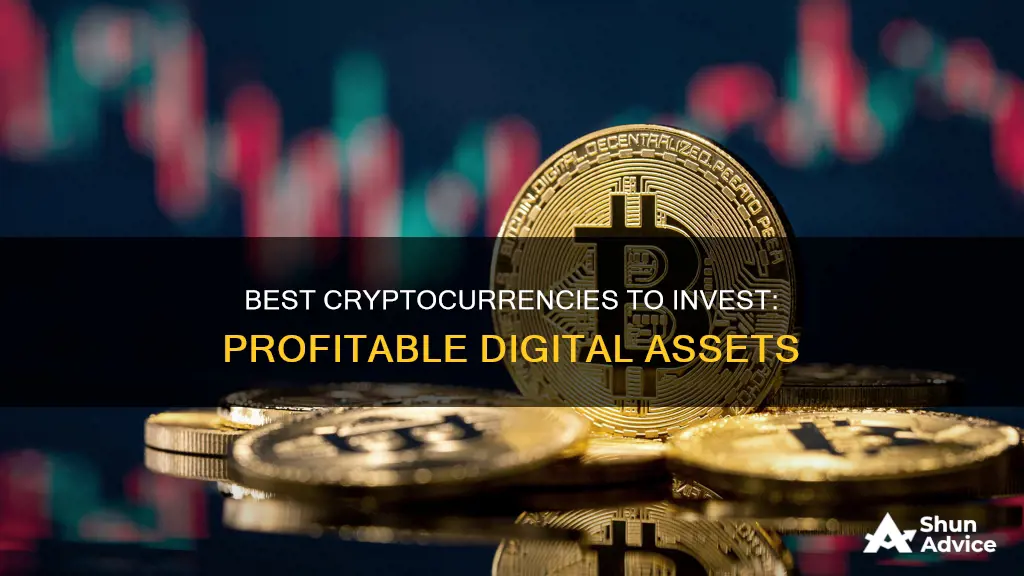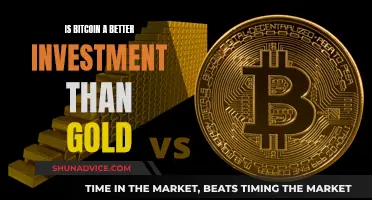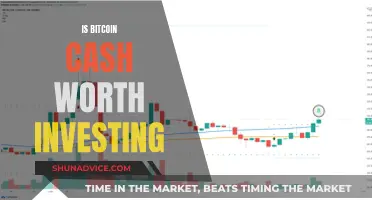
Cryptocurrencies are digital assets that are decentralised and based on cryptography. They are incredibly volatile and not for all investors. Bitcoin and Ethereum are the two best cryptocurrencies to buy, with the former being the most popular and valuable cryptocurrency, and the latter being the second-largest cryptocurrency. Other cryptocurrencies worth investing in include Binance Coin, Cardano, Solana, Dogecoin, and Avalanche.
What You'll Learn
- Bitcoin: the original cryptocurrency, most popular and valuable
- Ethereum: a favourite of developers, with smart contract functionality
- Tether: a stablecoin, with less volatility than other cryptos
- Binance Coin: used to trade and pay fees on the Binance exchange
- Solana: a blockchain with low transaction fees and high speed

Bitcoin: the original cryptocurrency, most popular and valuable
Bitcoin is the original cryptocurrency, created in 2008 and released as open-source software in 2009. It is a decentralized cryptocurrency, meaning it operates without a central authority or single administrator. Bitcoin is the most popular and valuable cryptocurrency, with a market capitalization of about $1.3 trillion, or roughly 53% of the overall market.
Bitcoin's value has skyrocketed as it has become a household name. In May 2016, one bitcoin was worth about $500. As of September 2024, a single bitcoin's price was around $56,902, representing a growth of 11,280%. Bitcoin's value is largely determined by speculation, and it has been described as an economic bubble by several economists.
Bitcoin is based on a free-market ideology, and its use as a currency began in 2009. It is currently used more as a store of value and less as a medium of exchange or unit of account. It is mostly seen as an investment. Bitcoin is pseudonymous, with funds linked to addresses, not real-world identities. This use of bitcoin by criminals has attracted the attention of regulators, leading to its ban by several countries as of 2021.
Bitcoin transactions are verified by nodes in the peer-to-peer network through cryptography and are recorded in a public distributed ledger called a blockchain. Miners group and broadcast new transactions into blocks, which are then verified by the network. Each block must contain a proof of work to be accepted, which involves finding a nonce number that produces a hash numerically smaller than the network's difficulty target. This process consumes large quantities of electricity and has been criticized for its environmental impact.
Bitcoin is the most established cryptocurrency, and its mainstream acceptance is evidenced by the debut of 11 new Bitcoin exchange-traded funds in January 2024. It is also the most volatile cryptocurrency, making it unsuitable for investors who are not willing to endure violent swings.
Crypto Wealth: What Could Have Been Mine
You may want to see also

Ethereum: a favourite of developers, with smart contract functionality
Ethereum is a favourite of developers for several reasons. Firstly, it was the first blockchain to introduce smart contract functionality, enabling developers to create and automate several key features. Ethereum also provides a platform for decentralised applications and finance, becoming the leading blockchain in this space.
The Ethereum Virtual Machine is another major selling point, as it is quasi-Turing-complete, allowing different high-level languages to compile. This enables the development of more complex decentralised applications through interactions with other smart contracts. The most popular high-level language for developing smart contracts is the scripting language "Solidity", which has syntax similar to the widely-used JavaScript language.
Ethereum also provides developers with useful tools to jump-start development, such as development frameworks, wallets, clients, and browser extensions. These tools facilitate the development of decentralised applications and reduce the effort required to connect to the blockchain.
Additionally, Ethereum's ecosystem provides a range of tools and documentation on foundational concepts and the development stack, and its vast developer community is at the forefront of innovation in the industry.
Ethereum's smart contract functionality has made it a leader in the non-fungible token (NFT) market, with the largest portion of sales occurring on the Ethereum blockchain.
Overall, Ethereum's ease of scripting, supportive tools, and robust developer community make it a favourite among developers.
How Americans Can Invest in Skycoin
You may want to see also

Tether: a stablecoin, with less volatility than other cryptos
Tether (USDT) is a stablecoin, a type of cryptocurrency that is pegged to the value of another asset, in this case, the US dollar. Stablecoins are designed to be less volatile than other cryptocurrencies, which can be extremely volatile.
Cryptocurrencies are decentralised digital currencies that are not issued by a central bank. They are often based on blockchain technology, which is a decentralised, transparent ledger of transactions. Cryptocurrencies are known for their high volatility, with their value fluctuating from day to day. This makes their role as a store of value problematic.
Tether, on the other hand, is designed to be more stable. Its value is supposed to be more consistent than other cryptocurrencies because it is backed by fiat currencies like the US dollar. This means that, in theory, the company managing Tether holds the equivalent value in US dollars as there are Tether coins in circulation. This makes Tether more useful than other cryptocurrencies as a medium of exchange.
However, Tether has been criticised for its lack of decentralisation, as it depends on an issuing entity. It has also been the subject of several controversies, with its parent company Bitfinex accused of not holding sufficient reserves to back the Tether coins in circulation.
Despite this, Tether is one of the most popular stablecoins and cryptocurrencies. As of late June 2024, it was the third-largest cryptocurrency by market capitalisation, worth more than $112 billion. It can be purchased on major crypto exchanges such as Kraken, Binance, and Coinbase.
District0x Coin: A Good Investment or Just Hype?
You may want to see also

Binance Coin: used to trade and pay fees on the Binance exchange
Binance Coin (BNB) is a form of cryptocurrency that you can use to trade and pay fees on Binance, one of the largest crypto exchanges in the world. Since its launch in 2017, Binance Coin has expanded past merely facilitating trades on Binance's exchange platform.
Binance is the world's leading cryptocurrency exchange, catering to 169 million registered users in over 180 countries. With low fees and over 350 cryptocurrencies to trade, Binance is the preferred exchange to trade Bitcoin, Altcoins, and other virtual assets.
Binance Coin has evolved from a simple token to powering its own ecosystem. Initially, BNB was used to provide special benefits to users of the Binance crypto exchange, such as lower fees, exclusive access to initial coin offerings, and cashback.
Today, it forms the backbone of the BNB Chain ecosystem, which boasts high speed and low cost to compete with Ethereum's dominance. It has established itself as a strong option in the market.
Owning BNB provides you with benefits on the Binance exchange platform. For example, users can earn rewards on more than 180+ cryptocurrencies by using one of the products offered on Binance Earn. The platform offers dozens of digital assets like Bitcoin, Ethereum, and stablecoins.
However, it is important to note that BNB is a highly centralized token, as it is controlled and managed by Binance. This reduces the freedom available to its community. Additionally, BNB's success is closely tied to Binance, which has faced regulatory scrutiny in several countries, including the United States.
Despite these considerations, Binance Coin has experienced significant growth and expansion since its launch. As of late September 2024, its price had risen to around $520, representing a gain of 519,478% since its inception.
NRIs and Bitcoin: What You Need to Know
You may want to see also

Solana: a blockchain with low transaction fees and high speed
Solana is a decentralised blockchain platform that was created with scalability in mind. It is one of the fastest blockchains on the market, with a transaction speed of almost 65,000 per second. This is achieved through the unique Proof of History consensus mechanism, which allows nodes to synchronise time across the network.
Solana has also gained recognition for its low transaction fees, which average $0.00025. In the first two years after its launch in 2020, Solana had a fixed approach to transaction fees, with fees per single transaction amounting to 0.000005 SOL. In 2022, an additional fee was introduced, allowing users to pay extra to prioritise certain transactions. According to Solscan, regular Solana transaction fees range between $0.003 and $0.030.
Solana's low fees, ease of use, and thriving ecosystem have recently attracted a lot of attention to its platform. Its low fees make it possible for various blockchain use cases, like smart contracts, non-fungible tokens, decentralised finance applications, and games, to become viable.
Solana is also more environmentally friendly than some other blockchains. While Bitcoin operates on proof of work, which consumes a lot of electricity, Solana's Proof of History consensus mechanism is much more energy-efficient.
However, it is important to remember that cryptocurrencies are incredibly volatile and a high-risk investment.
Explore Free Crypto: No Investment, Only Action
You may want to see also
Frequently asked questions
The top cryptocurrencies by market cap are Bitcoin and Ethereum. Together, they make up about 70% of the global cryptocurrency market cap.
Cryptocurrencies are extremely volatile and prone to regulatory crackdowns. They are also not backed by revenue-generating companies or other assets, making them a risky investment.
When choosing a cryptocurrency to invest in, it is important to consider the speed of transactions, the fees associated with transacting, and the level of adoption. It is also crucial to understand the risks involved and ensure that the investment aligns with your financial goals and risk tolerance.







